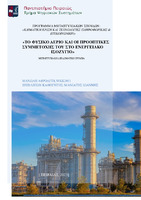Το φυσικό αέριο και οι προοπτικές συμμετοχής του στο ενεργειακό ισοζύγιο
Natural gas and the prospects of its participation in the energy balance

View/
Keywords
Φυσικό αέριο ; Ενεργειακό ισοζύγιο ; Ενεργειακό σύστημα Ελλάδας ; Ενεργειακό σύστημα Ευρώπης ; Παραγωγή ηλεκτρικής ενέργειας ; Παραγωγή φυσικού αερίου ; Ενεργειακή μετάβασηAbstract
Climate change is an existential threat to humanity. The main anthropogenic cause of the climate crisis is considered to be the reckless export, distribution and burning of fossil fuels, which produce greenhouse gases that lead to global warming. In the context of international conventions and agreements, the European Union has emerged as a leader in action to tackle climate change with the goal of reducing emissions by 55% by 2030 and zero carbon emissions by 2050. In this context, it is argued that the replacement of coal combustion by natural gas combustion would offer a significant reduction in greenhouse gas emissions. The gradual replacement of the use of all fossil fuels, including natural gas, by renewable sources of electricity and heat, as well as low carbon footprint fuels is necessary, however, this transition must be achieved without jeopardizing the adequacy and security of supplying the European economy and society with energy sources.
In Greece, the increase in the use of gas is inextricably linked to the decrease in the use of lignite in electricity generation. In recent years, Greece has emerged as an energy hub for natural gas transport. In addition, the development of national deposits, beyond a nationally beneficial option, is also a national contribution to regional energy security, therefore it must be prioritized and supported by every means.
This paper examines the above in an attempt to delineate the role that natural gas will be called upon to play in the energy system of Greece and Europe in the coming decades.


